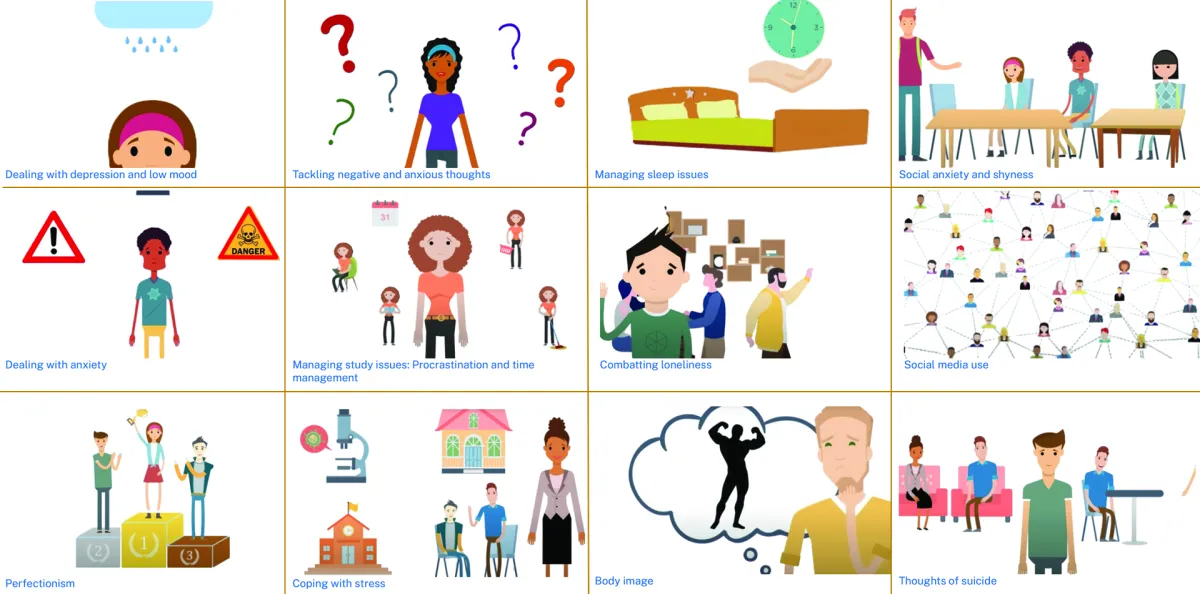
Uni Virtual Clinic: student mental health support at your fingertips
University life can be rewarding but also overwhelming. At least one in four Australian university students experience a mental health problem in any given year, which is higher than their peers not attending university.
“The university student experience is quite unique,” says Dr Lou Farrer, psychologist and Senior Research Fellow at the National Centre for Epidemiology and Population Health (NCEPH), “Students at university face really specific stresses and specific vulnerabilities.”
Despite the high prevalence of mental health problems among students, few receive expert mental health care. Instead, they typically approach friends, family, or other non-clinical sources of support.
“We know many people are heavily self-reliant, and even more so in the university environment because of potential stigma around seeking professional services, or going to talk to somebody,” says Farrer.
This sentiment was confirmed by a number of undergraduate students, with one saying:
“Some people don't like talking to others about what they go through. And some people would rather watch, like, information clips… I know a few of my friends are kind of skittish with, like, talking to people they don’t know.”
Other students might choose not to access in-person support services for other reasons such as wait times or cost.
Nevertheless, previous research has shown that almost half of university students would use an online programme for student wellbeing if one existed.
To Farrer, this highlights why digital healthcare is a necessary device in our mental health toolbox.
Online mental health interventions can be accessed at any time, are anonymous, can be a gateway to other forms of help-seeking, and most importantly: they work.
We know that digital interventions work through many, many years of trials and systematic reviews. Digital CBT (Cognitive behaviour therapy) can be just as effective as talking to somebody face to face,” says Farrer.
Which is why Farrer and her colleagues established Uni Virtual Clinic (UVC)—a free, online platform with easy access to information and tools to support mental health made specifically for university students.
UVC includes short videos, practical tips, exercises, quizzes, and recommendations as to when students might consider seeking further help. Topics have been carefully chosen to ensure they reflect the university student experience, and Farrer and other mental health experts worked closely with students, tutors, lecturers, and counselling services to achieve this.
“Each video starts with a student story,” says Farrer. “We have real students talking, and the scripts are based on real experiences, for example anxiety, loneliness, or body image.”
On trying UVC, one undergraduate student said:
“...it was good to know that… what I've been feeling…was validated in a way because it's like, a lot of university students will be going through this stuff.”
“Then in the later part of each video there is a psychologist character,” says Farrer, “They talk about what depression looks like in students, for example, and give a strategy they could try right now to help.”
Students can dip in and out of the 12 bite-size mental health topics. They can simply check-in on themselves by doing one of the quizzes, decide to implement some of the suggested activities or coping strategies, or be advised that they might benefit from talking to a professional.

The Uni Virtual Clinic has 12 brief video-based modules designed to support student mental health in a more flexible and accessible way. Image: Uni Virtual Clinic
So far, the students who have tried UVC have been largely positive about the experience. They appreciate the ability to pick and choose which topics are relevant to them, as well as the brief nature of the information provided.
“The modules were short enough to be manageable but long enough to provide good information,” said one undergraduate.
Others have already started using the new techniques they have learned:
“I loved the links to the exercises and implemented a few of them in my everyday life. This is because these activities were very realistic, easy, and did not take too much time to do. These activities were also new to me, allowing me to try out things that I hadn't before.”
Farrer intends to expand the topics available in the UVC in the future, in response to student input.
“The flexible nature of the UVC website enables us to develop new content based on what students need and want to see. I’m excited to continue to work with students on this,” says Farrer.
UVC is being launched through the ANU, but is available to students from any university in Australia who want to access it. There is no need to register, and it can be accessed from any device at any time. If you want to try UVC simply go to: uvc.anu.edu.au.
